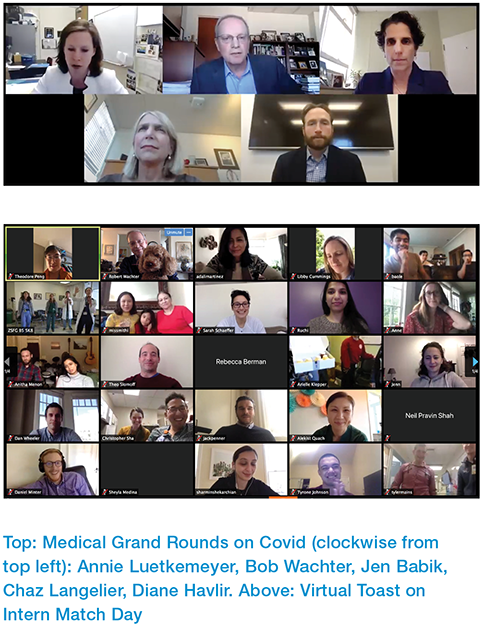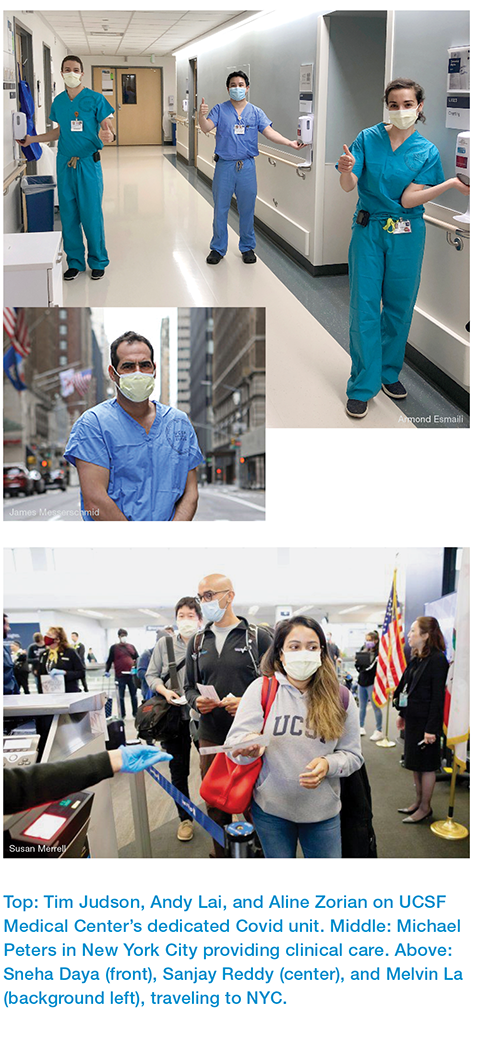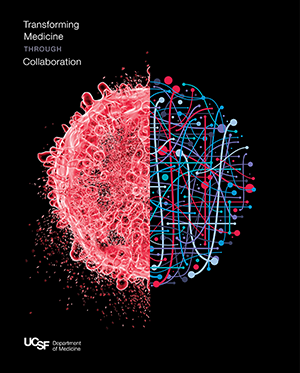DOM 2018-2019 Biennial Report
Dear Colleagues and Friends,
Like so many facets of our lives, the plans for the UCSF Department of Medicine biennial report were upended in early 2020 when reports of a novel virus reached our shores. Little did we know then the disruption and hardships that Covid-19 would cause.
 Just as we were preparing to go to press, the biennial report became one of the myriad things the pandemic disrupted. Though distributing the report is pretty trivial in the grand scheme of things, we had put in considerable time and effort to tell a story worth telling: the accomplishments of the approximately 3,000 faculty, trainees, and staff of this magnificent department. We did not want to let that story go untold, in part because it speaks to qualities that are essential to overcoming any challenge, including the one we all find ourselves grappling with.
Just as we were preparing to go to press, the biennial report became one of the myriad things the pandemic disrupted. Though distributing the report is pretty trivial in the grand scheme of things, we had put in considerable time and effort to tell a story worth telling: the accomplishments of the approximately 3,000 faculty, trainees, and staff of this magnificent department. We did not want to let that story go untold, in part because it speaks to qualities that are essential to overcoming any challenge, including the one we all find ourselves grappling with.
The report’s theme is the importance of collaboration, and you’ll read wonderful examples of people working across disciplines and locations – accomplishing far more than they could have alone. It will give you a sense of this department’s proud tradition of excellence across all of our missions, as well as its spirit and character. These traits have been on full display in the months since Covid-19 turned our lives upside down. And while collaboration has become more challenging in a world of physical distancing, it is part of this department’s DNA. In the face of this pandemic, we’ve done our very best to maintain and build the kind of relationships essential for progress.
Our clinicians have provided superb and compassionate care for patients with Covid-19, and our outcomes for patients in the hospital and ICU are, to date, far better than those reported in the literature. We’ve also transformed the way we care for our other patients, largely through the rapid adoption of telemedicine. The fraction of our ambulatory visits conducted by telemedicine has skyrocketed, from 2 percent to nearly 60 percent. To limit the number of visitors to our hospitalized patients with Covid-19, we're now doing some of our inpatient consultations through telemedicine as well.
 Our educators have responded, teaching us about Covid-19 in areas ranging from immunology to epidemiology. Our weekly Medical Grand Rounds on Covid-19-related topics have been viewed more than 185,000 times on YouTube. Moreover, our educators have transformed their regular curricula to meet today’s needs, converting many sessions to virtual, including virtual residents’ reports and virtual ward rounds. It was strange yet touching to participate in a virtual toast on Match Day, when our current house staff and faculty toasted our incoming interns, who were scattered around the nation but thrilled that they will soon join our UCSF family.
Our educators have responded, teaching us about Covid-19 in areas ranging from immunology to epidemiology. Our weekly Medical Grand Rounds on Covid-19-related topics have been viewed more than 185,000 times on YouTube. Moreover, our educators have transformed their regular curricula to meet today’s needs, converting many sessions to virtual, including virtual residents’ reports and virtual ward rounds. It was strange yet touching to participate in a virtual toast on Match Day, when our current house staff and faculty toasted our incoming interns, who were scattered around the nation but thrilled that they will soon join our UCSF family.
We depend on our researchers to help us to find solutions to Covid-19, and they too have answered the call. Department of Medicine faculty have been leading efforts, many of which have received national attention, in everything from the development and assessment of Covid-19 testing, clinical trials of potential therapies, epidemiology and modeling, assessing and recommending policy solutions, building contact-tracing capacity, developing data models and visualizations, and highlighting the impact of Covid-19 in populations such as minorities, the poor, the homeless, and people in prison and in skilled nursing facilities. Collaborations have enhanced virtually all of this work, through partnerships across other UCSF departments, institutes, and affiliated health systems; with local and state health departments; with the private sector; and with other academic organizations. And even in these difficult times, our philanthropic community has supported the work generously.
At this writing, San Francisco and the Bay Area have been mostly spared the tsunami of cases that devastated cities like New York, Milan, and Wuhan. While we are not out of the woods, we can feel good about the many lives saved here – and that once it became clear that the Bay Area would not be devastated, faculty and trainees volunteered to serve in harder-hit parts of the country. We now have about 50 UCSF clinicians, many from our department, delivering hands-on care in New York City and the Navajo Nation, and many more providing care through telemedicine. Given all I know about this department and its people, I find these acts of generosity both unsurprising and breathtakingly impressive.
I hope you’ll take some time to review this report, which chronicles the many contributions we made to improve health and health care before the virus hit. These activities served as a foundation for our department’s leadership during the Covid-19 pandemic, and will undoubtedly presage many more important contributions when this crisis is behind us.
Stay safe,

Robert M. Wachter, MD
Professor and Chair, Department of Medicine
Holly Smith Distinguished Professor in Science and Medicine
Lynne and Marc Benioff Endowed Chair in Hospital Medicine
